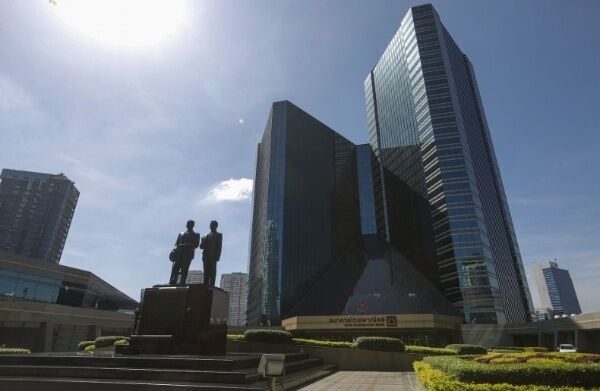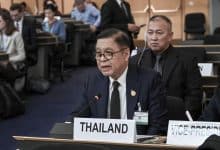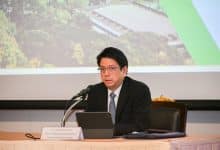SCB denies UN claims of aiding Myanmar military transactions

Siam Commercial Bank (SCB) firmly denied any involvement in irregular transactions with Myanmar, challenging claims made in a recent United Nations report concerning the bank’s alleged role in financing military procurement.
Tom Andrews, the UN special rapporteur on human rights in Myanmar, released a report this week detailing how Myanmar’s military regime continues to acquire weapons used against civilians. The report implicated 16 international banks, including five in Thailand, in facilitating defence procurement transactions for Myanmar’s State Administration Council, the official name for the junta.
According to the report, materials supplied to Myanmar’s Ministry of Defence from Thai-based companies included spare parts for helicopters and aircraft, as well as dual-use goods such as radio communications equipment, IT supplies, medical supplies, construction materials, tools, lubricants, and oil. However, a detailed breakdown of the value of these supplies was not provided.
The report highlighted a significant increase in the value of military goods exported from Thailand to Myanmar, which doubled in the 2023-24 fiscal year to US$120 million (approximately 4.4 billion baht).
The report noted that the value of these transactions rose from US$5 million in fiscal 2023 to US$100 million in the fiscal year ending in March 2024.
“The large increase in military procurement facilitated by Thai banks was largely driven by an increase in transactions passing through Siam Commercial Bank.”
SCB addressed these allegations yesterday.
“SCB currently provides international transaction services with the primary objective of supporting Thai and international businesses in paying for consumer products and services to Myanmar. These services adhere to laws and prioritise compliance with anti-money laundering laws.”
The bank explained that an internal investigation was conducted in response to media reports on transactions related to Myanmar.
“It was found that several transactions made by corporate customers were payments for consumer goods and energy, which are typical business activities.
“These transactions are not connected to the arms trade as reported in the news, and the total value has not significantly increased compared to last year. The bank performs due diligence to verify accuracy and reports these transactions to relevant authorities before processing.”
SCB reaffirmed its commitment to compliance with anti-money laundering and related regulations, ensuring adherence to principles of good governance and transparency, reported Bangkok Post.
“SCB aims to deliver long-term value to all stakeholder groups based on sustainable practices.”
ORIGINAL STORY: Thai banks fuel Myanmar’s bloodshed: UN
Thai banks have become the main financial lifeline for Myanmar’s military government, enabling it to buy goods and equipment for its brutal campaign against pro-democracy resistance and ethnic minority groups. This revelation comes from a UN report released yesterday, June 26, by Tom Andrews, the UN special rapporteur on the situation of human rights in Myanmar.
The report details how Myanmar’s military junta, formally known as the State Administration Council (SAC), has circumvented sanctions from the US, EU, and other states by switching to new financial and military suppliers. With Singapore firms pulling out, Thai companies have stepped in to fill the void, keeping the junta well-armed.
The report, titled Banking on the Death Trade: How Banks and Governments Enable the Military Junta in Myanmar, stated that over the past year, 16 banks in seven countries processed transactions for SAC military procurement, 25 banks have provided correspondent banking services to Myanmar’s state-owned banks since the coup.
Since seizing power in February 2021, Myanmar’s military has violently suppressed nonviolent protests, leading to a full-scale civil war. They face accusations of widespread human rights violations, including the bombing of civilians. Despite international efforts to isolate the junta, gaps in sanctions enforcement have allowed it to continue its reign of terror.
Andrews remarked that the good news is that the junta is increasingly isolated.
“The Myanmar military’s annual procurement of weapons and military supplies through the formal banking system declined by a third — from US$377 million (approximately 13.9 billion baht) to US$253 million. However, the bad news is that the junta is circumventing sanctions by exploiting gaps and shifting financial institutions.”
Thai banks, notably Siam Commercial Bank, allegedly have played a significant role, with transactions related to Myanmar military procurement skyrocketing from US$5 million in the 2022 financial year to over US$100 million in 2023.
Andrews’ report highlights the devastating impact of the conflict: over 5,000 civilians were killed, 3 million displaced, and 20,000 political prisoners, reported AP News.
“International banks facilitating transactions with Myanmar state-owned banks risk enabling military attacks on civilians. Banks must not facilitate crimes — this includes war crimes and crimes against humanity.”
Latest Thailand News
Follow The Thaiger on Google News:


























